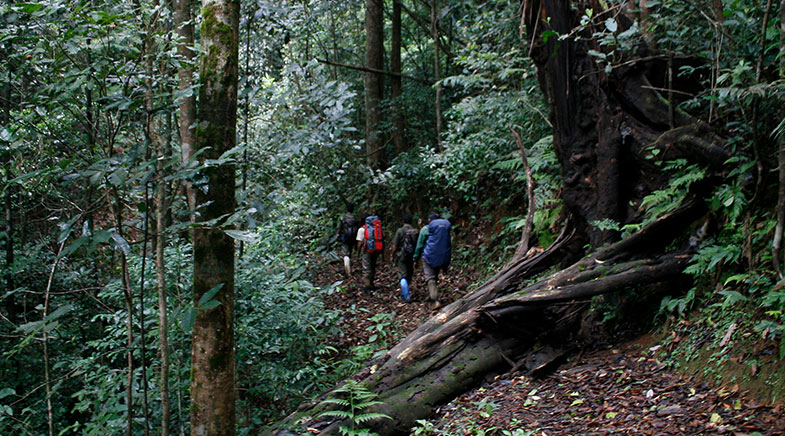Care is key
-
- from Shaastra :: vol 04 issue 10 :: Nov 2025

Start-ups focus on soil health, patient care, and water supply.
CUREOUS LABS
Founder: Asish Mohandas
Year: 2019
Big idea: An automated solution to bed sores
A visit to a hospital in Lucknow in 2016 prompted Asish Mohandas — then doing his Master's in Industrial and Product Design at the Indian Institute of Technology (IIT) Kanpur — to design a semi-automated system to facilitate the difficult process of shifting a patient from one bed to another. The innovation won him an award, and Mohandas went on to join a bio-design fellowship jointly offered by the All India Institute of Medical Sciences, New Delhi, and Stanford University, U.S., in collaboration with universities in Australia and Japan.

Clinical immersions in India and Australia helped him formulate another idea. Mohandas realised that bed sores were a serious problem faced by bedridden patients, who have to be repositioned regularly to prevent the development of these painful skin and tissue injuries. He wondered if this repositioning could be automated. "I wanted to build something that would help reduce patients' dependence on caregivers and, at the same time, reduce the burden on caregivers," says Mohandas.

So, he set up Cureous Labs, where he designed a pneumatic system that could be installed on any bed in under five minutes. There are programmable readings that relieve pressure points and, at regular intervals, reposition the patient on the bed. The product includes a control unit and an overlay resembling a quilt that can be placed on any bed. According to Mohandas, the algorithms in the control unit are programmed towards specific weight categories. The caregiver needs to enter the patient's weight and other parameters into the control unit, based on which it repositions the patient and keeps adjusting the pressure points. The overlay is made of thermoplastic polyurethane, which, he says, is biocompatible.
The overlay placed on the cot has two layers. The top layer features a system that relieves pressure points, and the bottom layer gradually changes the patient's position without causing discomfort. Users can programme the control unit with information such as how frequently the patient needs to be turned, to which side, and at what angle.
He says that the company has logged close to 40,000 hours of patient use on its devices, and there have been no reports of bed sores. Cureous Labs has started commercial deliveries of the product, named Eturnal, which it sells or rents out.
EKOSIGHT TECHNOLOGIES
Founders: Saumya Rawat and Dhiraj Choudhary
Year: 2021
Big idea: An IoT-based device to determine soil health
Saumya Rawat had studied soil health during her undergraduate and postgraduate programmes in agriculture. While on field visits, she realised that farmers were not overly concerned about soil health, even though it affected crop yields. Keen to raise awareness among farmers about the importance of soil health, she started Ekosight Technologies with Dhiraj Choudhary, an electrical, electronic and communication engineer.

Ekosight offers Soil Doctor, an IoT (Internet of Things)-based product that tests soil health. The hand-held device enables a quick analysis of 14 vital soil parameters, more than what is possible with other devices currently available, Rawat says. Ekosight's product, launched commercially in 2024, can be used to test pH, nitrogen, phosphorus, potassium, magnesium, calcium, sulphur, iron, boron, zinc, copper, and electrical conductivity. The device is part of a kit that includes reagents and chemicals needed for the tests.


According to Rawat, the company has trained non-governmental organisations (NGOs) and farmer-producer organisations (FPOs) in rural areas to conduct the tests. The results go directly from the device to Ekosight's cloud platform and are then converted into detailed analyses and advisories to farmers. The company works with more than 15 FPOs and over half a dozen NGOs. The product is available in Uttar Pradesh, Punjab, Rajasthan, Andhra Pradesh, Telangana and Maharashtra. "Ekosight's aim," says Rawat, "is to make precision soil testing and nutrient recommendations accessible and affordable to farmers." Through this, the company believes it will be able to reduce the use of fertilisers, lower input costs and improve yield through better soil health management, leading to higher incomes for farmers.
Rawat says the device can complete the tests in an hour and deliver its report to farmers immediately afterwards. The company's artificial intelligence model analyses all parameters, understands their relationships, and provides a customised advisory to farmers. She reckons that inadequate knowledge about soil health makes it difficult for farmers to increase productivity, which, in turn, prevents them from diversifying their crops.
Ekosight produces about 20 devices a month, and plans to expand its capacity. So far, Rawat says, the company has tested more than 5,000 soil samples.
AJIVAM WATER
Founders: Pradip Kalbar and Anujkumar Ghorpade
Year: 2022
Big idea: Ensuring equitable distribution of water with uniform pressure
A successful water supply venture in a Maharashtra village led to Ajivam Water. Pradip Kalbar, Associate Professor in the Department of Environmental Science and Engineering at the Indian Institute of Technology (IIT) Bombay, had installed a 'shaft' system in the village in Palghar with his PhD student, Anujkumar Ghorpade. They monitored the system's results for almost two years and realised it significantly improved water pressure. To improve water supply systems across the country, Kalbar and Ghorpade decided to commercialise the technology and formed Ajivam Water.
PHOTO: BY SPECIAL ARRANGEMENT

Ajivam Water founder Pradip Kalbar
Ghorpade says they conducted detailed studies in Telangana, Maharashtra, and West Bengal and developed the 'shaft' and 'manifold' systems to address challenges posed by inequitable and inadequate water supplies. He explains that the shaft consists of two pipes: the outer one, with a diameter of 300-700 mm and a height of 12-18 m, opens up to the sky; the inner pipe is 100-250 mm wide, and its height depends on local conditions. Instead of water from an overhead tank directly being conveyed through a pipeline to a locality, which often results in reduced pressure at the tail-end, the tank water is first let into the inner pipe like a fountain, which fills the outer pipe. This ensures that the water level – and, thereby, the pressure – is maintained. Multiple outlets can be connected to the outer pipe. A shaft system can serve a radius of up to 1.5-2 km, according to Ghorpade.
PHOTO: BY SPECIAL ARRANGEMENT

Ajivam Water founder Anujkumar Ghorpade.
He explains that the shaft is designed to break the Hydraulic Grade Line and create a hydraulic isolation barrier. It acts as a separator, dividing the incoming water pressure from the demand side, ensuring that the pressure is managed efficiently and evenly. The internal inlet pipe regulates the incoming water flow, separating it from the demand side. This separation, according to him, ensures that water is distributed effectively to different areas without excessive pressure fluctuations. The manifold system is a pipe-valve arrangement for controlling water flow and maintaining pressure. In large water-transmission networks, a manifold helps maintain uniform pressure and improves system performance. Incubated at the Society for Innovation and Entrepreneurship at IIT Bombay, Ajivam Water has had the patent rights transferred to it.

Ghorpade says that Ajivam Water has demonstrated the effectiveness of the system in several States. It designs and fabricates structures for its customers, including local bodies. The company has deployed the systems in more than 25 locations.
Have a
story idea?
Tell us.
Do you have a recent research paper or an idea for a science/technology-themed article that you'd like to tell us about?
GET IN TOUCH














